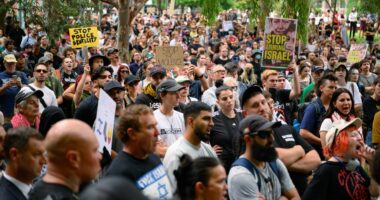Share this @internewscast.com
President Donald Trump listens during a ceremonial swearing in of Paul Atkins as chairman of the Securities and Exchange Commission, in the Oval Office of the White House, Tuesday, April 22, 2025, in Washington (AP Photo/Alex Brandon).
A federal judge in Florida on Thursday offered some matter-of-fact criticism of the Trump administration”s immigration detention policy.
Notably, the judge issuing the criticism did so in one of the first orders he issued after having been confirmed earlier this month.
On Sept. 9, U.S. District Judge Kyle C. Dudek was confirmed by a 53-45 U.S. Senate vote. Previously, Dudek served on the same bench as a U.S. magistrate judge after being selected by district judges in the Middle District of Florida in 2022.
On May 28, President Donald Trump nominated Dudek for the district judge role. Dudek is now recognized as one of Trump’s initial second-term nominees who has ruled against the government.
This ruling is related to a case focused on the Trump administration’s attempts to revise how Immigration and Customs Enforcement (ICE) categorizes certain immigrants.
Attorney for Marvin Hernandez Lopez filed a petition for a writ of habeas corpus under seal after his detention at the Glades County Detention Center, a facility the American Civil Liberties Union (ACLU) is campaigning to close.
While the details of the case are mostly under lock and key, Dudek recited a few while granting a temporary restraining order.
“Lopez entered the United States illegally in 2013,” the court order states. “He later married, had children, and began a business. Following a 2019 traffic stop, Lopez attempted to legalize his immigration status…He was arrested by ICE on his route to work last month.”
Legally relevant to the case is the statute ICE cites for detention authority, 8 U.S.C. § 1225(b).
Under this statute, the prospect of release from immigration detention is dim – in fact, detention is widely considered mandatory. And, the immigration judge who heard Lopez’s plea for bond rejected the request in turn, concluding he “is subject to mandatory detention,” Dudek notes.
But, that’s the wrong statute for people like Lopez, the judge says.
Instead, the court found that the section of the Immigration and Nationality Act (INA) that ICE may correctly apply to long-term immigrant residents is § 1226(a), which allows for release on money bond or parole.
Dudek relies on a U.S. Supreme Court case from 2018. Stylized as Jennings v. Rodriguez, the upshot from the fractured holdings in that case has proven to be something of a double-edged sword – allowing for indefinite detention under § 1225(b) and for parole under § 1226(a).
The newly-minted district court judge cites the high court at length:
There, the Court observed that the decision of who may enter this country and who may remain “generally begins at the Nation’s borders and ports of entry, where the Government must determine whether an alien seeking to enter the country is admissible.” As relevant here, the Court explained that § 1225 “applies primarily to aliens seeking entry into the United States.” By contrast, § 1226 “applies to aliens already present in the United States.” “Section 1226(a) creates a default rule for those aliens by permitting—but not requiring—the Attorney General to issue warrants for their arrest and detention pending removal proceedings.” “Section 1226(a) also permits the Attorney General to release those aliens on bond.”
The Supreme Court’s analysis explains the necessity for both statutes by differentiating between the detention of arriving aliens who are seeking entry into the United States under § 1225, and the detention of those who are already present in the United States under § 1226.
Applying the precedent to Lopez’s case, Dudek easily finds that a man with a wife, children, and a business in the country is subject to the more forgiving standards of § 1226(a).
And, the judge notes, he’s not alone.
“Against this backdrop, every court to address the question presented here has found that an alien who is not presently seeking admission and has been in the United States for an extended time, like Lopez, is appropriately classified under § 1226(a) and not § 1225(b),” the order continues. “These courts have also either ordered the alien’s release or required a bond hearing—the exact relief Lopez seeks.”
Dudek goes on to consider the factors for a temporary restraining order and determines that without “immediate” and “interim relief to maintain the status quo, Lopez could be deported or removed from this Court’s jurisdiction, effectively foreclosing any recourse.”
The court, however, does not go so far as to use the temporary restraining order to prohibit the use of § 1225(b) or to mandate the use of § 1226(a). This is because, Dudek notes, that relief “is identical to what Lopez seeks in his underlying habeas petition.”
Still, the court’s order leans heavily in the plaintiff’s direction.
Again, the judge, at length:
Turning to the merits, Lopez has shown a substantial likelihood of success. Boiled down, Lopez alleges that he is unlawfully held under § 1225(b)(2), which mandates his detention, instead of under § 1226(a)’s discretionary detention scheme, where he could be eligible for release. And as a result, his continued detention without a bond hearing is unconstitutional.
“[T]he Court is only ordering that Lopez remain within its jurisdiction until his habeas petition is decided,” Dudek summarizes. “So the harm to the Government is minimal. And because Lopez is arguably detained unlawfully under § 1225(b)(2), neither equity nor the public’s interest are furthered by holding him without the opportunity to seek release on bond.”















